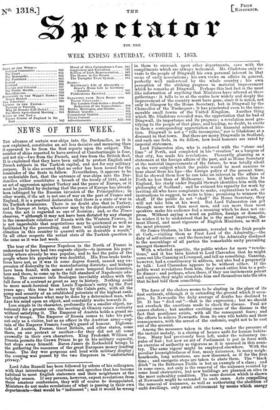The tour of the Emperor Napoleon in the North of
France is understood to have had two cognate objects—to increase his popu- larity where already he was popular, and to feel the pulse of the
people where his popularity was doubtful. His Free-trade tenta- tives have not, as it was in some degree feared, caused any ex- pression of disloyalty in the manufacturing districts ; and bishops have been found, with minor and more temporal functionaries, here and there, to come up to the full standard of Napoleonic adu- lation. The entrance into Boulogne inevitably strikes with the full force of a contrast as great as any in history. Nothing could be more mock-heroical than Louis Napoleon's entry by the Port years ago ; this time he enters by the Calais gate, with all the pomp and security of an established potentate of the highest rank. The contrast teaches what may be done by a determined man, who fixes his mind upon an object, and constantly works towards it.
Less simple in its character, professedly for a smaller object, no- toriously for a greater one, the meeting at Olmiitz raises curiosity without satisfying it. The Emperor of Austria holds a grand re- view of troops. The Emperor of Russia comes to take his part, not only as a visitor, but as an officer in the Austrian army—cap- tain of the Emperor Francis Joseph's guard of honour. Diploma- tists of Austria, France, Great Britain, and other states, come there, on one pretext or another—for they did not all come avowedly in their own characters. King Frederick William of Prussia permits the Crown Prince to go in his military capacity, but stops away himself. Baron James de Rothschild brings to the gathering the resources of the great European money-lending house. The day was gorgeous and loud with military display ; the evening was passed by the two Emperors in "undisturbed privacy."


























